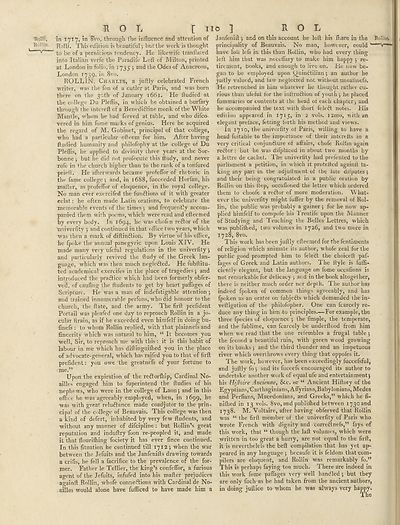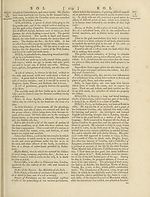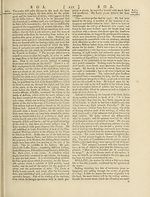Encyclopaedia Britannica, or, a Dictionary of arts, sciences, and miscellaneous literature : enlarged and improved. Illustrated with nearly six hundred engravings > Volume 18, RHI-SCR
(118) Page 110
Download files
Complete book:
Individual page:
Thumbnail gallery: Grid view | List view

R O I
■Roll!, in I/T7, in 8V0, through tlie influence and attention of
Kollm. Rolli. This edition is beautiful; hut the work is thought
to be of a pernicious tendency. He likewii’e tranflated
into Italian verle the Paradife Loft of Milton, printed
at London in folio, in 1 735 ; and the Odes of Anacreon,
London 1739, in 8vo.
ROLLIN, Charles, a juftly celebrated French
writer, was the fon of a cutler at Paris, and was born
there on the 30th of January 1661. He itudied at
the college Du Pleflis, in which he obtained a burfary
through the intereft of a Benedidtine monk ofthe White
Mantle, whom he had ferved at table, and who difco-
vered in him fome marks of genius. Here he acquired
the regard of M. Gobinet, principal of that college,
who had a particular efteem for him. After having
ftudied humanity and philofophy at the college ot Du
Pleflis, he applied to divinity three years at the Sor-
bonne ; but he did not profecutc this ftudy, and never
rofe in the church higher than to the rank of a tonfured
prieft. He afterwards became profeflbr of rhetoric in
the fame college; and, in 1688, fucceeded Horfan, his
mailer, as profeflbr of eloquence, in the royal college.
No man ever exercifed the fundlions of it with greater
eclat : he often made Latin orations, to celebrate the
memorable events of the times ; and frequently accom¬
panied them with poems, which were read and efteemed
by every body. In 1694, he was choftn re£lor of the
univerfity ; and continued in that office two years, which
was then a mark of diftindlion. By virtue of his office,
he fpoke the annual panegyric upon Louis XIV. He
made manv very ufeful regulations in the univerfity ;
and particularly revived the ftudy of the Greek lan¬
guage, which was then much neglected. He fubftitu-
ted academical exercifes in the place of tragedies; and
introduced the practice which had been formerly obfer-
ved, of caufing the ftudents to get by heart paflages of
Scripture. He was a man of indefatigable attention ;
and trained innumerable perfons, who did honour to the
church, the ftate, and the army. The firft prefident
Portail was pleafed one day to reproach Rollin in a jo¬
cular (train, as if he exceeded even himfelf in doing bu-
finefs : to whom Rollin replied, with that plainnefs and
fincerity which was natural to him, “ It becomes you
well, Sir, to reproach me with this : it is this habit of
labour in me which has diftinguiflied you in the place
of advocate-general, which has raifed you to that of firft
prefident: you owe the greatnefs of your fortune to
me.’1'
Upon the expiration of the re&orfliip, Cardinal No-
ailles engaged him to fuperintend the ftudies of his
nephews, who were in the college of Laon; and in this
office he was agreeably employed, when, in 1699, he
was with great reluftance made coadjutor to the prin¬
cipal of the college of Beauvais. This college was then
a kind of defert, inhabited by very few ftudents, and
without any manner of difeipline: but Rollin’s great
reputation and induftry foon re-peopled it, and made
it that flouriftiing fociety it has ever fince continued.
In this fituation he continued till 1712; when the war
between the Jefuits and the Janfenifts drawing towards
a crifis, he fell a facrifice to the prevalence of the for¬
mer. Father le Tellier, the king’s confeflbr, a furious
agent of the Jefuits, infufed into his matter prejudices
againtt Rollin, whofe connexions with Cardinal de No-
ailles would alone have fufficed to have made him a
R O L
Janfenift ; and on this account he loft his (hare in the Boliin,
principality of Beauvais. No man, however, could
have loll lefs in this than Rollin, who had every thing
left him that was necelfary to make him happy ; re¬
tirement, books, and enough to live on. He now be¬
gan to be employed upon (^uindtilian; an author he
judly valued, and iaw neglected not without unealinefs.
He retrenched in him whatever he thought rather cu¬
rious than ulelul for the inltrubtion of youth ; he placed
fummaries or contents at the head ot each chapter; and
he accompanied the text with ftiorf leleX notes. His
edition appeared in 1715, in 2 vols. 12mo, with an
elegant preface, fetting lorth his method and views.
In 1710, the univerfity ot Paris, willing to have a
head fuitable to the importance of their intcrelts in a
very critical conjuncture ot aftairs, chole Rollin again
reXor : but he was dilplaced in about two months by
a lettre de cachet. The univerfity had prefented to the
parliament a petition, in which it protetted againtt ta¬
king any part in the adjultment ot the late dilputes;
and their being congratulated in a public oration by
Rollin on this ttep, occafioned the letter which ordered
them to choofe a reXor of more moderation. What¬
ever the univerfity might fuffer by the removal of Rol¬
lin, the public was probably a gainer ; for he now ap¬
plied himfelf to compofe his Treatife upon the Manner
of Studying and Teaching the Belles Lettres, which
was publilhed, two volumes in 1726, and two more in
1728, 8vo.
This work has been juftly efteemed for the fentiments
of religion which animate its author, whole zeal for the
public good prompted him to feleX the choiceft paf-
fages of Greek and Latin authors. The ftyle is fuffi*
ciently elegant, but the language on fome occafions is
not remarkable for delicacy ; and in the book altogether,
there is neither much order nor depth. The author has
indeed fpoken of common things agreeably, and has
fpoken as an orator on fubjeXs which demanded the in-
veftigation of the philofopher. One can fcarcely re¬
duce any thing in him to principles.—For example, the
three fpecies of eloquence ; the fimple, the temperate,
and the fublime, can fcarcely be underftood from him
when we read that the one reiembles a frugal table ;
the fecond a beautiful ruin, with green wood growing
on its banks; and the third thunder and an impetuous
river which overthrows every thing that oppofes it.
The work, however, has been exceedingly fuccefsful,
and juftly fo; and its fuccefs encouraged its author to
undertake another work of equal ufe and entertainment;
his Hijloire Ancienne, &.c. or “ Ancient Hiftory of the
Egyptians, Carthaginians, A flyrians,Babylonians, Medes
and Perfians, Macedonians, and Greeks,” which he fi-
niflred in 13 vols. 8vo, and publiflied between 1730 and
1738. M. Voltaire, after having obferved that Rollin
was “ the firft member of the univerfity of Paris who
wrote French with dignity and - correXnefs,” fays of
this work, that “ though the laft volumes, which were
written in too great a hurry, are not equal to the firft,
it is nevertbelefs the belt compilation that has yet ap¬
peared in any language ; bt caufe it is feldom that com¬
pilers are eloquent, and Rollin Was remarkably fo.”
This is perhaps faying too much. There are indeed in
this work fome pafl'ages very well handled ; but they
are only fuch as he had taken from the ancient authors,
in doing juftice to whom he was always very happy.
The
[ no 1
■Roll!, in I/T7, in 8V0, through tlie influence and attention of
Kollm. Rolli. This edition is beautiful; hut the work is thought
to be of a pernicious tendency. He likewii’e tranflated
into Italian verle the Paradife Loft of Milton, printed
at London in folio, in 1 735 ; and the Odes of Anacreon,
London 1739, in 8vo.
ROLLIN, Charles, a juftly celebrated French
writer, was the fon of a cutler at Paris, and was born
there on the 30th of January 1661. He itudied at
the college Du Pleflis, in which he obtained a burfary
through the intereft of a Benedidtine monk ofthe White
Mantle, whom he had ferved at table, and who difco-
vered in him fome marks of genius. Here he acquired
the regard of M. Gobinet, principal of that college,
who had a particular efteem for him. After having
ftudied humanity and philofophy at the college ot Du
Pleflis, he applied to divinity three years at the Sor-
bonne ; but he did not profecutc this ftudy, and never
rofe in the church higher than to the rank of a tonfured
prieft. He afterwards became profeflbr of rhetoric in
the fame college; and, in 1688, fucceeded Horfan, his
mailer, as profeflbr of eloquence, in the royal college.
No man ever exercifed the fundlions of it with greater
eclat : he often made Latin orations, to celebrate the
memorable events of the times ; and frequently accom¬
panied them with poems, which were read and efteemed
by every body. In 1694, he was choftn re£lor of the
univerfity ; and continued in that office two years, which
was then a mark of diftindlion. By virtue of his office,
he fpoke the annual panegyric upon Louis XIV. He
made manv very ufeful regulations in the univerfity ;
and particularly revived the ftudy of the Greek lan¬
guage, which was then much neglected. He fubftitu-
ted academical exercifes in the place of tragedies; and
introduced the practice which had been formerly obfer-
ved, of caufing the ftudents to get by heart paflages of
Scripture. He was a man of indefatigable attention ;
and trained innumerable perfons, who did honour to the
church, the ftate, and the army. The firft prefident
Portail was pleafed one day to reproach Rollin in a jo¬
cular (train, as if he exceeded even himfelf in doing bu-
finefs : to whom Rollin replied, with that plainnefs and
fincerity which was natural to him, “ It becomes you
well, Sir, to reproach me with this : it is this habit of
labour in me which has diftinguiflied you in the place
of advocate-general, which has raifed you to that of firft
prefident: you owe the greatnefs of your fortune to
me.’1'
Upon the expiration of the re&orfliip, Cardinal No-
ailles engaged him to fuperintend the ftudies of his
nephews, who were in the college of Laon; and in this
office he was agreeably employed, when, in 1699, he
was with great reluftance made coadjutor to the prin¬
cipal of the college of Beauvais. This college was then
a kind of defert, inhabited by very few ftudents, and
without any manner of difeipline: but Rollin’s great
reputation and induftry foon re-peopled it, and made
it that flouriftiing fociety it has ever fince continued.
In this fituation he continued till 1712; when the war
between the Jefuits and the Janfenifts drawing towards
a crifis, he fell a facrifice to the prevalence of the for¬
mer. Father le Tellier, the king’s confeflbr, a furious
agent of the Jefuits, infufed into his matter prejudices
againtt Rollin, whofe connexions with Cardinal de No-
ailles would alone have fufficed to have made him a
R O L
Janfenift ; and on this account he loft his (hare in the Boliin,
principality of Beauvais. No man, however, could
have loll lefs in this than Rollin, who had every thing
left him that was necelfary to make him happy ; re¬
tirement, books, and enough to live on. He now be¬
gan to be employed upon (^uindtilian; an author he
judly valued, and iaw neglected not without unealinefs.
He retrenched in him whatever he thought rather cu¬
rious than ulelul for the inltrubtion of youth ; he placed
fummaries or contents at the head ot each chapter; and
he accompanied the text with ftiorf leleX notes. His
edition appeared in 1715, in 2 vols. 12mo, with an
elegant preface, fetting lorth his method and views.
In 1710, the univerfity ot Paris, willing to have a
head fuitable to the importance of their intcrelts in a
very critical conjuncture ot aftairs, chole Rollin again
reXor : but he was dilplaced in about two months by
a lettre de cachet. The univerfity had prefented to the
parliament a petition, in which it protetted againtt ta¬
king any part in the adjultment ot the late dilputes;
and their being congratulated in a public oration by
Rollin on this ttep, occafioned the letter which ordered
them to choofe a reXor of more moderation. What¬
ever the univerfity might fuffer by the removal of Rol¬
lin, the public was probably a gainer ; for he now ap¬
plied himfelf to compofe his Treatife upon the Manner
of Studying and Teaching the Belles Lettres, which
was publilhed, two volumes in 1726, and two more in
1728, 8vo.
This work has been juftly efteemed for the fentiments
of religion which animate its author, whole zeal for the
public good prompted him to feleX the choiceft paf-
fages of Greek and Latin authors. The ftyle is fuffi*
ciently elegant, but the language on fome occafions is
not remarkable for delicacy ; and in the book altogether,
there is neither much order nor depth. The author has
indeed fpoken of common things agreeably, and has
fpoken as an orator on fubjeXs which demanded the in-
veftigation of the philofopher. One can fcarcely re¬
duce any thing in him to principles.—For example, the
three fpecies of eloquence ; the fimple, the temperate,
and the fublime, can fcarcely be underftood from him
when we read that the one reiembles a frugal table ;
the fecond a beautiful ruin, with green wood growing
on its banks; and the third thunder and an impetuous
river which overthrows every thing that oppofes it.
The work, however, has been exceedingly fuccefsful,
and juftly fo; and its fuccefs encouraged its author to
undertake another work of equal ufe and entertainment;
his Hijloire Ancienne, &.c. or “ Ancient Hiftory of the
Egyptians, Carthaginians, A flyrians,Babylonians, Medes
and Perfians, Macedonians, and Greeks,” which he fi-
niflred in 13 vols. 8vo, and publiflied between 1730 and
1738. M. Voltaire, after having obferved that Rollin
was “ the firft member of the univerfity of Paris who
wrote French with dignity and - correXnefs,” fays of
this work, that “ though the laft volumes, which were
written in too great a hurry, are not equal to the firft,
it is nevertbelefs the belt compilation that has yet ap¬
peared in any language ; bt caufe it is feldom that com¬
pilers are eloquent, and Rollin Was remarkably fo.”
This is perhaps faying too much. There are indeed in
this work fome pafl'ages very well handled ; but they
are only fuch as he had taken from the ancient authors,
in doing juftice to whom he was always very happy.
The
[ no 1
Set display mode to:
![]() Universal Viewer |
Universal Viewer | ![]() Mirador |
Large image | Transcription
Mirador |
Large image | Transcription
Images and transcriptions on this page, including medium image downloads, may be used under the Creative Commons Attribution 4.0 International Licence unless otherwise stated. ![]()
| Permanent URL | https://digital.nls.uk/193020241 |
|---|
| Attribution and copyright: |
|
|---|
| Description | Ten editions of 'Encyclopaedia Britannica', issued from 1768-1903, in 231 volumes. Originally issued in 100 weekly parts (3 volumes) between 1768 and 1771 by publishers: Colin Macfarquhar and Andrew Bell (Edinburgh); editor: William Smellie: engraver: Andrew Bell. Expanded editions in the 19th century featured more volumes and contributions from leading experts in their fields. Managed and published in Edinburgh up to the 9th edition (25 volumes, from 1875-1889); the 10th edition (1902-1903) re-issued the 9th edition, with 11 supplementary volumes. |
|---|---|
| Additional NLS resources: |
|

